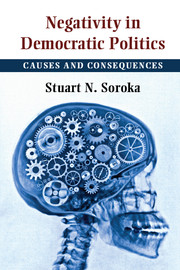Book contents
2 - Negativity in Politics
Published online by Cambridge University Press: 05 June 2014
Summary
Nothing travels faster than light, with the exception of bad news, which follows its own rules.
– Douglas AdamsIs a negativity bias evident in work on politics as well? Yes, although the observation that negative information carries more weight in political decision making has been somewhat dispersed and spread across several subfields. There are some domains in which negativity has clearly received a good deal of attention, of course; for instance, there is a considerable body of work on negative campaign advertising. As a discipline, however, political science has been rather slow to come around to the idea that negative information may matter more than positive information does. This is somewhat ironic, given that one does not have to look very far to find critiques arguing that politics and news media are too focused on the negative. Nevertheless, the incorporation of a negativity bias into political scientists’ views of political behavior, of political communication, or of electoral and legislative politics more generally has yet to happen.
This chapter gets the ball rolling by pulling together a disparate but, as we shall see, relatively consistent body of work concerned with a negativity bias in politics. The chapter reviews work on evaluations of political leaders, political economy, political advertising, and political communications. Much of the chapter is a review of existing work – a state of the discipline, where observations of negativity biases are concerned. The chapter ends with a new observation, however: it proposes that the negativity bias is evident in the design of political and legal institutions. More specifically, the chapter includes an introduction to the argument that a wide range of political and legal institutions has been designed to process information like the human brain, focusing far more on negative information than on positive information. (That said, this chapter includes just an introduction to this topic; the link between evidence in subsequent chapters and the design of political institutions is given further attention in Chapter 7.) First, however, I begin with early work in political behavior.
- Type
- Chapter
- Information
- Negativity in Democratic PoliticsCauses and Consequences, pp. 15 - 31Publisher: Cambridge University PressPrint publication year: 2014

